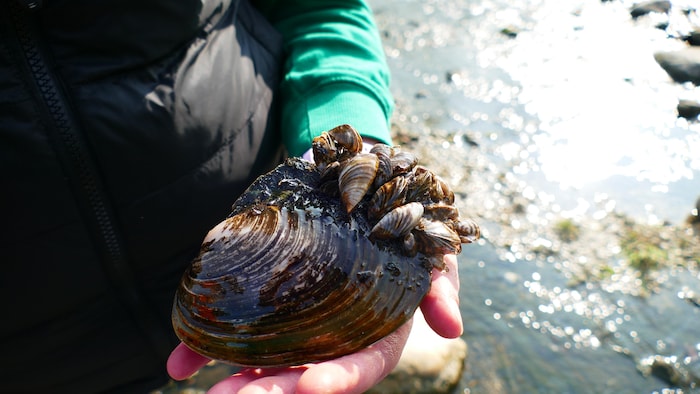Open in full screen mode Zebra mussels pose a threat to other aquatic species, according to Fisheries and Oceans Canada. (Archive photo) Radio-Canada Feature being tested Log inCreate my account Speech synthesis, based on artificial intelligence, makes it possible to generate spoken text from written text. Parks Canada confirms the presence of live specimens of zebra mussels, an invasive species, in Riding Mountain National Park in western Manitoba. In a news release , Parks Canada explains having detected traces of zebra mussel DNA in Clear Lake last January The agency specifies that results of the analysis of water samples taken from the lake, received in November, indicated the presence of environmental DNA of zebra mussels in Boat Cove throughout the season. Staff responsible for monitoring the bloom of the freshwater mollusk then conducted more monitoring and took more samples, which allowed them to confirm the presence of live zebra mussels in the lake. Parks Canada promises to communicate further information on the situation as it becomes available.
Clear Lake in Riding Mountain National Park, Manitoba. (File photo)
Zebra mussels first appeared in Canada in the late 1980s and have since become well established in Ontario and in Quebec, in particular. It proliferates following the fresh water bodies of the continent.
In Manitoba, the westernmost Canadian province where it is found, the first adult specimens of zebra mussels were discovered in 2013 in Lake Winnipeg. Ten years later, this invasive aquatic species has settled permanently in several lakes and rivers in the province.
According to Manitoba government aquatic invasive species specialist Candace Parks, zebra mussels feed on algae that other aquatic species, such as small fish and invertebrates, rely on.
On its site (New window), Parks Canada explains that the species aggressively invades new areas and reproduces quickly.
It favors hard underwater surfaces, including the hulls of the boats it colonizes, reducing food resources and threatening native wildlife.
Parks Canada indicates that zebra mussels can affect power plants, water treatment plants and cottages in addition to causing costly nuisances for boaters, commercial fishermen, anglers and fishermen. bathers.
With information from Chelsea Kemp

